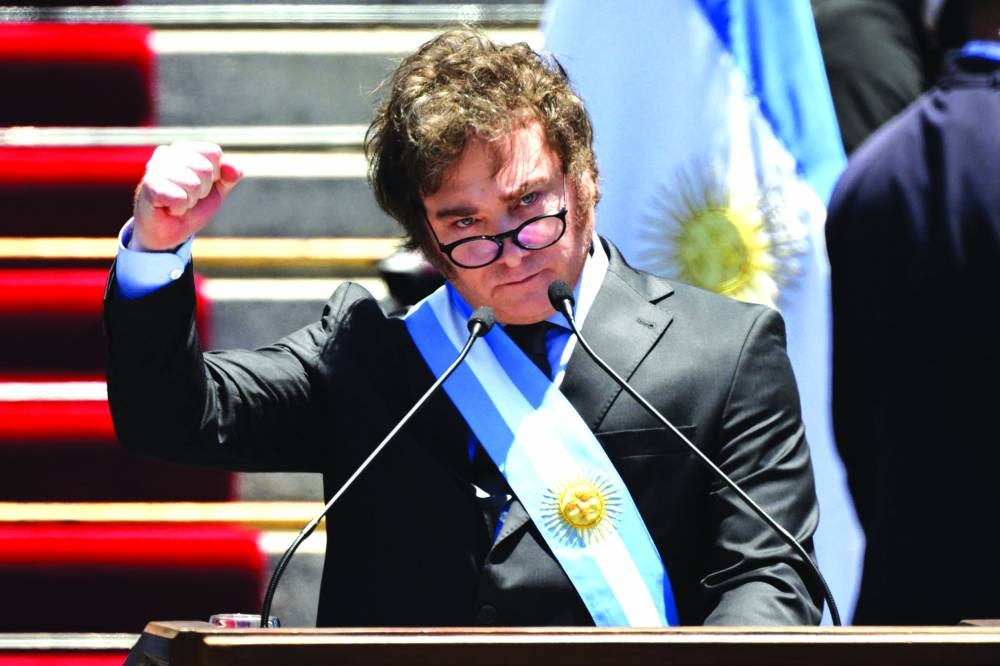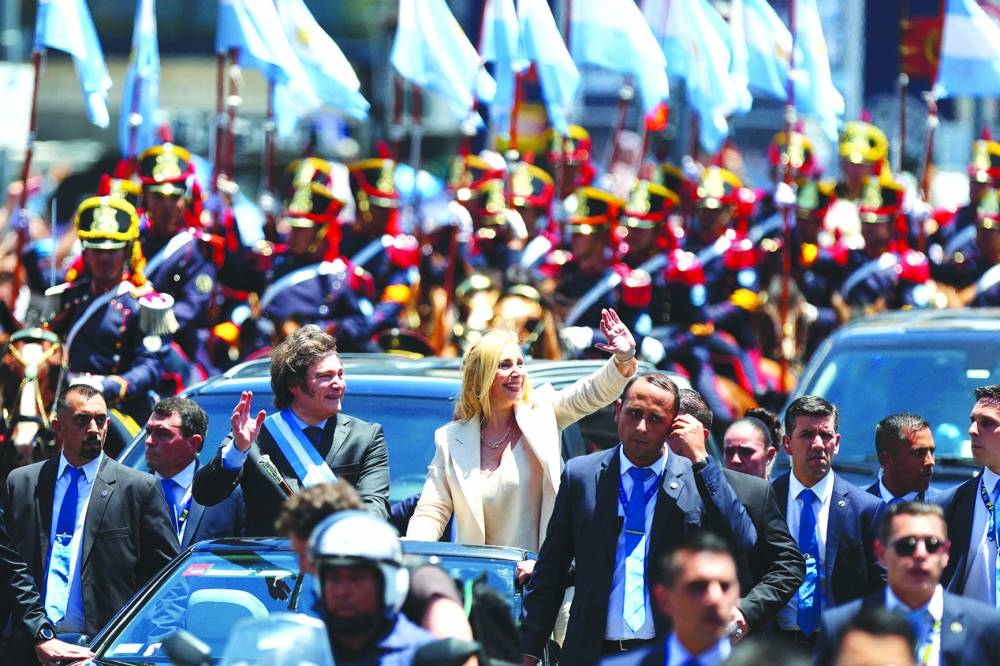Argentina’s Javier Milei was sworn in yesterday, warning the country to brace itself for painful austerity measures as he seeks to cut spending and curb triple-digit inflation, all with empty coffers.
The 53-year-old libertarian economist broke with tradition to address thousands of supporters from the steps of Congress, who waved flags and chanted “freedom!” and “chainsaw!” in reference to the power tool he carried around while campaigning to symbolise spending cuts.
“There is no money,” said Milei, vowing to put an end to “decades of decadence” by his overspending predecessors who he said had left him “the worst inheritance” of any prior government.
“The bottom line is that there is no alternative to austerity and there is no alternative to shock treatment.
“We know that in the short term the situation will worsen. But then we will see the fruits of our efforts.”
Inflation has hit almost 140% year-on-year and 40% of the population lives in poverty. Analysts have warned government reserves are deep in the red, and the heavily indebted country has few credit options.
Milei warned of spending cuts equivalent to five percent of gross domestic product in Latin America’s third-biggest economy.
After his speech he made his way — partly on foot, partly in a convertible — from the neo-classical Congress building to the Casa Rosada (Pink House) presidential palace, waving to supporters and flanked by his sister Karina, his closest confidant.
Milei was to later swear in a cabinet of nine ministers — a major slimdown from the current 18. He has said his first set of measures will be presented to Congress in a matter of days.
Earlier Milei spoke briefly to Ukraine’s President Volodymyr Zelensky on the steps of Congress, and the two men shared a warm embrace. Zelensky said on social media he had also held talks with leaders of Ecuador, Paraguay, and Uruguay as he sought to shore up support for war-torn Ukraine.
Also attending the ceremony was Hungary’s nationalist Prime Minister Viktor Orban — the only EU leader who has maintained close ties to Russia.
“The Right is rising not only in Europe but all around the world,” Orban wrote on social media, sharing a picture of a meeting with his “good friend,” Brazil’s far-right ex-president Jair Bolsonaro, who is also in town for the ceremony.
Chile’s leftist leader Gabriel Boric and the King of Spain Felipe VI are also attending, alongside representatives from other major nations.
Milei’s inauguration caps a meteoric rise for the former television panellist who entered politics only two years ago.
His rants against the “thieving” establishment fired up voters and drew comparisons to leaders like Bolsonaro and former US president Donald Trump.
With his deliberately dishevelled mop of hair and rock star persona, he would wave a powered-up chainsaw at political rallies, promising to slash public spending and a bloated cabinet.
He vowed to “dynamite” the central bank and replace the ailing peso with the US dollar.
But for Argentines, the future is mired in uncertainty over what exactly their new president plans to do.
With few lawmakers from his party in Congress the hard reality of politics has set in, and Milei has softened many of his stances and allied with politicians he previously insulted, incorporating some into his cabinet.
Talk of shutting the Central Bank, dollarisation and welfare cuts has dissipated.
“Milei 2.0 will still face an uphill climb, but he appears to have adopted a more pragmatic agenda and sought the advice of more experienced political figures,” said Benjamin Gedan, director of the Argentina Project at the Washington-based Wilson Center.
Among the questions hanging over Argentines’ heads in the coming days will be whether Milei will devaluate the strictly controlled peso and loosen the currency controls which have birthed a multitude of dollar exchanges.
Economist Victor Beker of the University of Belgrano said the first “litmus test” for Milei will be if he actually halts the money printing by the Central Bank that he has so derided, which funds much of the government’s spending.
Milei has warned that it could take between 18 and 24 months to bring the country’s inflation under control, warning of months of “stagflation” — rising prices coupled with economic stagnation.
For 2023, the International Monetary Fund (IMF) has projected a contraction of 2.5% in Argentine GDP. “Perhaps it will take us many years to rebuild the country but maybe this is the beginning of a new era for us,” said Javier Lobos, 41, a shopkeeper.
“We will be able to work and strive to fulfil our dreams without the burden of suffocating taxes, inflation and the strain of a currency system that is crippling our nation.”

Argentina’s new president Javier Milei gestures as he delivers his inaugural speech before the crowd during an inauguration ceremony at the Congress in Buenos Aires yesterday. (AFP, Reuters)

Milei and his sister Karina wave to supporters after the swearing-in ceremony.
